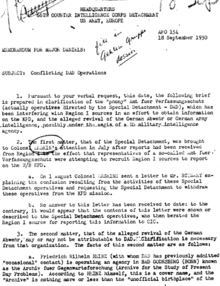Friedrich Wilhelm Heinz Service
The Friedrich-Wilhelm-Heinz service , short FWH service or FWHD , was a 1950 initiated Intelligence Service of the Federal Republic of Germany . It was named after its first director, Friedrich Wilhelm Heinz . The official name of the service was Archive for Contemporary Research , from 1954 Archive for Current Events . It existed until 1956.
history
In 1950, the former armored troop general Gerhard Graf von Schwerin was commissioned by Federal Chancellor Adenauer to set up a task force under the umbrella of the Federal Chancellery under the name of Dienststelle Schwerin . This also included supplying the Federal Chancellery with secret information. By Achim Oster Schwerin was Friedrich Wilhelm Heinz announced. In July 1950, Heinz was "attached" to the Schwerin office . This meant that he worked for the Federal Chancellery, but was not regularly paid by it. Under the umbrella of the Schwerin office , Heinz began to set up an intelligence service. In contrast to the Gehlen Organization and the other secret services of the Federal Republic of Germany, the FWHD was not controlled by the Allied occupying powers , which violated the conditions of surrender , but was tolerated by the occupying powers. The background to this was that Adenauer did not only want to rely on intelligence information from the Allied intelligence services. In February 1953 Johannes Kirsch became deputy head of the service.
organization
The first seat of the FWHD was Bad Godesberg , later also Frankfurt . In the late autumn of 1950 the 'Schwerin Office' was dissolved and the FWHD was taken over by the successor authority, the Blank Office . In 1951 the seat of the service was finally relocated to Wiesbaden . Soon after, the first branch offices were set up in Berlin and Munich . The FWHD also had bases in Vienna and Trieste .
In 1951 the service had a budget of 346,000 DM, in 1953 700,000 DM with an estimated 200 employees. By comparison, the Gehlen organization had a budget of 20 million DM and 3500 employees in 1954.
Fields of activity
The focus of the work in 1950 was the clarification of the domestic political situation in the Federal Republic and the armament in the Soviet zone of occupation . Information was also collected on right-wing and left-wing radical organizations, soldiers' associations, politicians and other personalities. The German service groups of the American Labor Service Unit were also checked . The areas of responsibility thus overlapped extensively with those of the Federal Intelligence Service and the Office for the Protection of the Constitution. This created a competition between the individual intelligence services, which Heinz was not up to in the long run.
resolution
In 1953, Heinz was accused of pretending to be a colonel , even though he only held the rank of lieutenant colonel . He was found guilty in a court case, despite declaring himself innocent because he believed he had been made Colonel, which he could not prove. Heinz therefore submitted his resignation, which was approved by Theodor Blank on October 1, 1953. He was then on leave and released from civil service in 1954 . The FWHD was then renamed "Archive for Current Affairs" and continued to exist until March 31, 1956. After that, the service was transferred to parts of the Bundeswehr and other German intelligence services.
literature
- Susanne Meinl: National Socialists against Hitler - The national revolutionary opposition around Friedrich Wilhelm Heinz. Siedler Verlag, Berlin 2000, ISBN 3-88680-703-7 .
- Susanne Meinl, Dieter Krüger: The political path of Friedrich Wilhelm Heinz. In: Vierteljahrshefte für Zeitgeschichte . Volume 42, Issue 1, January 1994, pp. 39-69 (PDF; 7.7 MB).
- Susanne Meinl: In the maelstrom of the Cold War. Friedrich Wilhelm Heinz and the beginnings of the West German intelligence services 1945–1955. In: Wolfgang Krieger, Jürgen Weber (Eds.): Espionage for Peace? Olzog, Munich / Landsberg a. L. 1997, ISBN 3-7892-9280-X , pp. 247-266.
Individual evidence
- ^ Susanne Meinl, Dieter Krüger: The political way of Friedrich Wilhelm Heinz . In: Vierteljahrshefte für Zeitgeschichte . tape 42 , no. 1 , 1995, p. 56 ff .
- ↑ “Always on the enemy!” - The Military Counter-Intelligence Service (MAD) 1956–1990 . 1st edition. Vandenhoeck & Ruprecht , Göttingen 2019, ISBN 978-3-525-36392-8 , pp. 211 f .
- ^ Susanne Meinl, Dieter Krüger: The political way of Friedrich Wilhelm Heinz . In: Vierteljahrshefte für Zeitgeschichte . tape 42 , no. 1 , 1995, p. 57, 59 .
